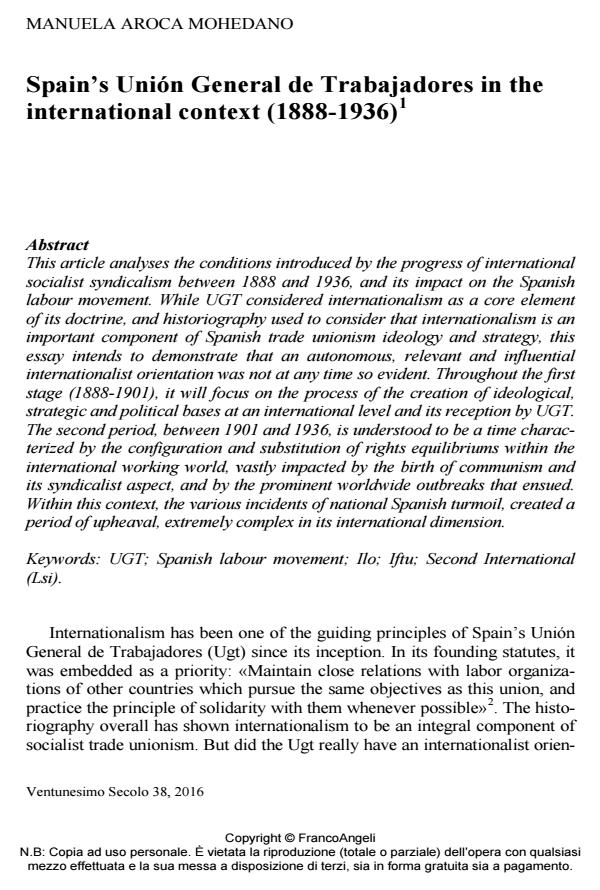Spain’s Unión General de Trabajadores in the international context (1888-1936)
Journal title VENTUNESIMO SECOLO
Author/s
Publishing Year 2016 Issue 2016/38
Language English Pages 25 P. 9-33 File size 168 KB
DOI 10.3280/XXI2016-038002
DOI is like a bar code for intellectual property: to have more infomation
click here
Below, you can see the article first page
If you want to buy this article in PDF format, you can do it, following the instructions to buy download credits

FrancoAngeli is member of Publishers International Linking Association, Inc (PILA), a not-for-profit association which run the CrossRef service enabling links to and from online scholarly content.
This article analyses the conditions introduced by the progress of international socialist syndicalism between 1888 and 1936, and its impact on the Spanish labour movement. While UGT considered internationalism as a core element of its doctrine, and historiography used to consider that internationalism is an important component of Spanish trade unionism ideology and strategy, this essay intends to demonstrate that an autonomous, relevant and influential internationalist orientation was not at any time so evident. Throughout the first stage (1888-1901), it will focus on the process of the creation of ideological, strategic and political bases at an international level and its reception by UGT. The second period, between 1901 and 1936, is understood to be a time characterized by the configuration and substitution of rights equilibriums within the international working world, vastly impacted by the birth of communism and its syndicalist aspect, and by the prominent worldwide outbreaks that ensued. Within this context, the various incidents of national Spanish turmoil, created a period of upheaval, extremely complex in its international dimension.
Keywords: UGT; Spanish labour movement; Ilo; Iftu; Second International (Lsi).
- J. Cuesta, Una esperanza para los trabajadores. Las relaciones entre España y la Organización Internacional del Trabajo (1919-1939), Consejo Económico y Social, Madrid 1994.
- S. Castillo, Un sindicalismo consciente (1873-1914). Historia de la UGT, Siglo XXI, Madrid 2008.
- J. Cuesta, Francisco Largo Caballero: su compromiso internacional, Fundación Francisco Largo Caballero, Madrid 1997.
- G. Van Goethem, The Amsterdam Inernational. The World of the International Federation of Trade Unions (IFTU) 1913-1945, Aldershot, Ashgate 2006.
- G. Haupt, Le congrès manqué. L’internationale à la veille de la Première Guerre mondiale, François Maspero, Paris 1965.
- C. Howard Ellis, The Origin, Structure & Working of the League of Nations, The lawbook Exchange, New Jersey 2003.
- J. Jaumandreu, La Tercera Internacional, Editorial Mañana, Madrid 1977.
- A. Kriegel, Las Internacionales Obreras (1864-1943), Ediciones Orbis, Barcelona 1986.
- A. Kochanski, «El sindicalismo latinoamericano: Materiales del archivo moscovita de la Internacional Sindical Roja», Estudios latinoamericanos, n.º 11, 1988, pág. 249-295.
- J.L. Martín Ramos, Entre la revolución y el reformismo (1914-1931). Historia de la UGT, Siglo XXI, Madrid 2008.
- A. Montoya Melgar, “El Reformismo Social en los orígenes del Derecho del Trabajo”, Revista del Ministerio de Trabajo e Inmigración, nº Extra 1, 2003.
- E. Moral, El socialismo español en el contexto internacional de la Primera a la Segunda Internacional (1864-1889), tesis leída en la UCM, Madrid 1995.
- J.J. Morato, Historia de la Sección Española de la Internacional (1868-1874), Edición facsímil, Fundación Francisco Largo Caballero, Madrid 2010.
- Andreu Nin, Las organizaciones obreras internacionales, Fontamara, Barcelona 1978.
- F. de los Ríos, Mi viaje a la Rusia sovietista, Fundación Fernando de los Ríos, Madrid 1994.
- J. Rojahn (ed.), The Communist International and its National Sections, 1919-1943, Ed. Peter Lang, Bern 1994.
- A. del Rosal, Los Congresos Obreros Internacionales en el siglo XX, Grijalbo, Barcelona-Buenos Aires, México 1975.
- W. Schevenels, Quarante cinq années. Fédération Syndicale Internationale, 1901-1945, Editions de l’Institut E. Vandervelde, Bruxelles, S.l., 1964.
- Francisco Largo Caballero. Obras Completas. Escritos y discursos 1910-1939, Ed. Monsa-FFLC, Barcelona 2003.
- Internacionalistas entre la revolución y el fascismo: la Unión General de Trabajadores en el mundo (1919-1936) Manuela Aroca Mohedano, in Hispania /2018 pp.323
DOI: 10.3989/hispania.2018.008
, Spain’s Unión General de Trabajadores in the international context (1888-1936) in "VENTUNESIMO SECOLO" 38/2016, pp 9-33, DOI: 10.3280/XXI2016-038002